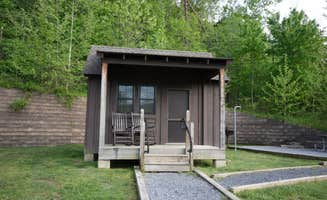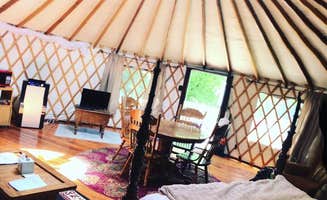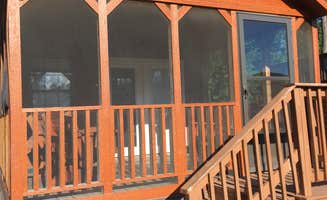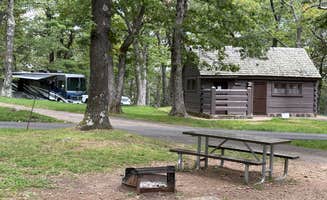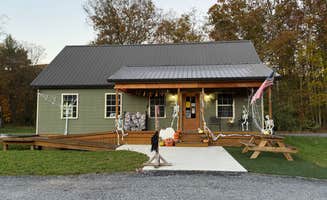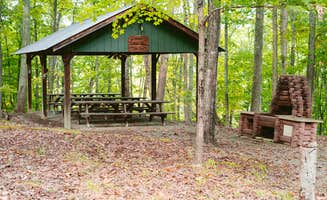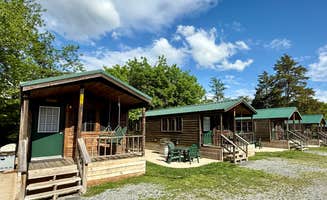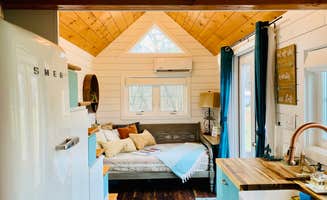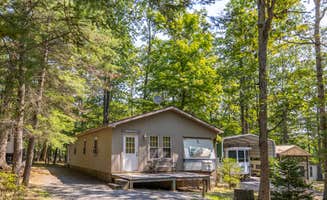Yurt camping near Toms Brook, Virginia provides access to the Appalachian foothills with elevations ranging from 500 to 2,500 feet throughout the region. The area experiences seasonal temperature variations with summer highs averaging 85-90°F and winter lows dropping to 20-30°F. Most riverside campsites in this region remain accessible from April through October, though several sites offer winter yurt accommodations with heating systems.
What to do
Hiking nearby trail networks: At Trout Pond Recreation Area, accessible trails surround the clear lake waters. "We hiked around Rock Cliff Lake and observed petrified wood. Swimming is excellent with sand beach. Big catfish in clear water. Water was so clean that it was throbbing with freshwater jellyfish," shares Fred F., highlighting the unique geological features.
Off-road adventures: The Cove Campground offers miles of trails for ATVs and dirt bikes alongside shooting range facilities. "This Campground had everything I wanted. Shooting range, ATV trails, fishing, hiking and great campsites," notes Ben M. The property maintains both family-friendly spaces and adventure terrain across 400+ acres.
River tubing access: Low Water Bridge Campground provides direct river entry points for tubing and kayaking. "We could not have asked for a nicer location! Our tent was about 20 feet from the river and the campground had everything we could have asked for," writes Matthew G. River trips range from 3-8 miles depending on entry points, with varying difficulty levels based on seasonal water levels.
What campers like
Primitive riverside sites: Shenandoah River State Park offers walk-in tent sites with river proximity. "There are several rustic campsites located on the Southfork of the Shenandoah River, as well as modern electric sites, RV sites, and cabins. Park and campgrounds are clean and well maintained," explains Ricki F. These sites provide water-adjacent camping without the crowding of larger developed areas.
Winter camping options: Several campgrounds remain open year-round, including Big Meadows Campground. "We camped here the last night of the season (Nov30) and shared the campground with a mix of tent campers, car/van campers, and a few larger units. The bathrooms were plentiful, heated, hot running water, and a utility sink available," reports Carol B. Winter camping requires additional preparation but offers solitude.
Dark skies for stargazing: The relative distance from major urban centers creates excellent night sky viewing. "And finally, the fireflies are spectacular. At dusk, the ground shimmers, and then after they disperse, you will still see them flit by the tent throughout the night," notes Veronica S. from Big Meadows Campground. Most campsites have minimal light pollution interference.
What you should know
Cell service limitations: Many campsites have limited or no cellular connectivity. "There is absolutely no Verizon service here (ATT seems to work pretty well). You'll have to drive 10-15 in either direction on Rt. 211 before you can catch a signal," warns a camper at Low Water Bridge Campground. Plan communications accordingly, especially for emergency situations.
River current safety: The Shenandoah River flow varies significantly by season. "The current can be strong, so be mindful of the river level," notes a visitor. Children require close supervision, and personal flotation devices are recommended for all water activities regardless of swimming ability.
Wildlife encounters: Local campgrounds house diverse wildlife populations. "We saw many deer and bear while camping. Just being in Shenandoah is a soothing experience," mentions Rachel M. Food storage protocols exist at most sites, with some providing bear boxes to prevent unwanted animal interactions.
Tips for camping with families
Kid-friendly activities: Yogi Bear's Jellystone Park Luray features numerous structured children's programs. "The kids loved running off in the open field and playing on the zip line. We loved that we could see them from our site. The birthday boy also loved the outdoor laser tag!" shares Jen O. Most weekend activities run from late morning through early evening.
Camp wagon availability: Some properties provide equipment transport assistance. "The primitive spots are right next to the river. The spots are a short walk from the parking area and the campground provides wagons to transport your stuff," explains Matt P. about Shenandoah River State Park. This helps families manage gear without multiple trips.
Bathroom accessibility: Consider campsite proximity to facilities when traveling with children. "Our site, B112, was surrounded by shrubs under the canopy of trees which provided tons of privacy. Plus the accessible site across from us was empty during our whole stay, which added to the privacy. The bathroom was a nice short walk away," notes Veronica S. Sites closest to bathrooms experience more foot traffic.
Tips from RVers
Seasonal site recommendations: KOA Luray RV Resort offers year-round yurt camping with electrical hookups. "All level padded sites. Most with Blue ridge views," notes Sally S. Most yurt accommodations include platform bases, which eliminate concerns about ground conditions during wet seasons.
Limited dump stations: Plan black and gray water management accordingly. "Water and electrical available at all the spots even though it was winter. Bathrooms and showers were nearby and clean. No cell service but the Visitor's Center has WiFi available," writes John B. about Shenandoah River State Park Campground. Some sites provide full hook-ups while others only offer partial services.
Access road considerations: Several campgrounds have challenging approach roads. "The drive in requires about 25-miles through the roller coaster of steep grade(7+%) hills. There's no way around that, you're in the mountains. Just be aware and be prepared," cautions Matt S. Larger RVs should research route conditions before arrival, particularly after weather events.


